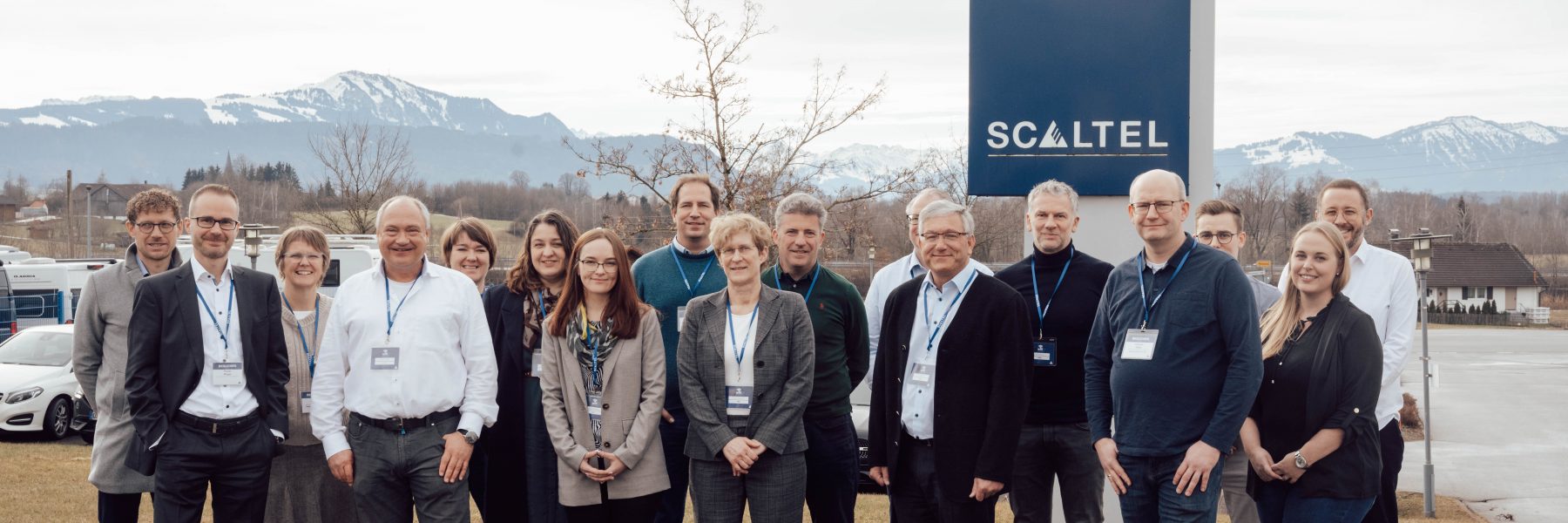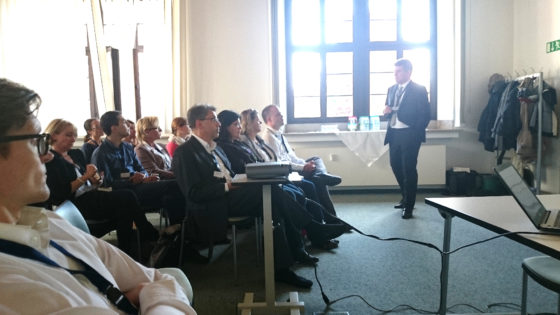Am 24. Januar 2025 fand das Treffen des ICV-Regionalkreises Bodensee/Allgäu statt – dieses Mal bei der SCALTEL Gruppe in Waltenhofen. Das Unternehmen, ein führender IT-Dienstleister mit Spezialisierung auf Netzwerkinfrastruktur und Cyber-Security, bot den Teilnehmenden exklusive Einblicke in seine hochmoderne Sicherheitszentrale und innovative Controlling-Methoden.
Cyber-Security und Künstliche Intelligenz – Aha-Effekte garantiert
Ein Highlight des Treffens war die Besichtigung der SCALTEL-Sicherheitszentrale, in der remote mehrere hundert Kunden betreut werden. Besonders eindrucksvoll: Jährlich gehen hier Millionen von sicherheitsrelevanten Events ein. Damit menschliche Mitarbeitende diese Informationsflut überhaupt bewältigen können, spielt Künstliche Intelligenz eine entscheidende Rolle. Sie übernimmt die automatische Klassifikation und Bearbeitung, bevor die kritischen Fälle an die Support-Ebenen weitergeleitet werden – bereits mit einem Lösungsvorschlag. Für viele Teilnehmer war es ein echter Aha-Moment, die Bedeutung und Effizienz von KI in der Praxis so hautnah zu erleben.
Innovatives Controlling mit Kundenfokus
Auch das Controlling-System von SCALTEL beeindruckte die Teilnehmenden. Mit dem Infinity Track verfolgt das Unternehmen einen einzigartigen Ansatz: Statt nur auf interne KPIs zu setzen, stehen Kennzahlen entlang des gesamten Kunden-Lebenszyklus im Mittelpunkt. So wird Controlling nicht nur als Steuerungsinstrument für das Unternehmen selbst genutzt, sondern auch zur kontinuierlichen Verbesserung der Kundenbeziehungen. Ein Teilnehmer fasste es treffend zusammen:
“Diese umfassende und kundenzentrierte Betrachtung kenne ich von anderen Unternehmen in dieser Form nicht.”
Herausforderungen und Erfolgsfaktoren beim KI-Einsatz
Das Thema Künstliche Intelligenz im Controlling wurde auch durch Prof. Dr. Sven Henning, Hochschule Kempten vertieft. In seinem Vortrag stellte er zentrale Herausforderungen vor, die es zu bewältigen gilt, um KI erfolgreich in Unternehmen zu implementieren:
- Akzeptanz: Ohne die Akzeptanz der Mitarbeitenden bleibt selbst die beste KI wirkungslos.
- Verlässlichkeit: KI-Modelle müssen stabil und zuverlässig arbeiten, um Vertrauen aufzubauen.
- Vertrauen: Der Mensch bleibt im Zentrum – Vertrauen in die Ergebnisse der KI ist essenziell.
- Modellqualität: Die zugrundeliegenden Modelle müssen regelmäßig überprüft und weiterentwickelt werden.
- Training: KI ist nur so gut wie ihr Training – kontinuierliche Verbesserung ist entscheidend.
- Daten: Die Basis für jede KI-Anwendung sind hochwertige und gut strukturierte Daten.
Diese Erfolgsfaktoren wurden anhand praktischer Beispiele verdeutlicht – insbesondere in der Cyber-Security, wo KI eine Schlüsselrolle bei der automatisierten Erkennung und Bekämpfung von Bedrohungen spielt.
Arbeitskreise als Plattform für Wissenstransfer und Networking
Neben den Praxisbeispielen bot das Treffen erneut Impulse zur Nutzung Künstlichen Intelligenz im Controlling. Der Austausch über Erfahrungen, Herausforderungen und Best Practices machte deutlich, wie wichtig es ist, sich kontinuierlich weiterzubilden und neue Entwicklungen aktiv mitzugestalten.
Zum Abschluss gab es – bei einem kleinen Snack – Raum für Erfahrungsaustausch und Networking. Viele Teilnehmende hoben hervor, wie wertvoll der direkte Austausch mit anderen Fachleuten ist, um eigene Fragestellungen zu reflektieren und neue Impulse für die Praxis mitzunehmen.
Fazit: Ein rundum gelungenes Treffen mit wertvollen Einblicken, guten Diskussionen und einem starken Gemeinschaftsgefühl. Kein Wunder, dass sich alle schon auf das nächste Arbeitskreis-Treffen freuen!
Info: Prof. Dr. Sven Henning, Leiter AK Bodensee/Allgäu
The meeting of the ICV Regional Work Group Bodensee/Allgäu took place on January 24, 2025 – this time at the SCALTEL Group in Waltenhofen. The company, a leading IT service provider specializing in network infrastructure and cyber security, offered participants exclusive insights into its state-of-the-art security center and innovative controlling methods.
Cyber Security and Artificial Intelligence – Aha Effects Guaranteed
A highlight of the meeting was the tour of the SCALTEL security center, where several hundred customers are supported remotely. What is particularly impressive is that millions of security-relevant events are received here every year. Artificial Intelligence plays a crucial role in ensuring that human employees can even handle this flood of information. It takes over the automatic classification and processing before the critical cases are forwarded to the support levels – already with a suggested solution. For many participants, it was a real aha moment to experience the importance and efficiency of AI in practice so closely.
Innovative Controlling with Customer Focus
SCALTEL’s controlling system also impressed the participants. With the Infinity Track, the company follows a unique approach: instead of just relying on internal KPIs, the focus is on key figures along the entire customer lifecycle. Controlling is therefore not only used as a management tool for the company itself, but also for the continuous improvement of customer relationships. One participant summed it up aptly:
“I don’t know of any other company that takes this comprehensive and customer-centric approach.”
Challenges and success factors in the use of AI
The topic of Artificial Intelligence in controlling was also discussed in more detail by Prof. Dr. Sven Henning from Kempten University. In his lecture, he presented key challenges that need to be overcome in order to successfully implement AI in companies:
- Acceptance: Without the acceptance of employees, even the best AI remains ineffective.
- Reliability: AI models must work stably and reliably in order to build trust.
- Trust: People remain at the center – trust in the results of the AI is essential.
- Model quality: The underlying models must be regularly checked and further developed.
- Training: AI is only as good as its training – continuous improvement is crucial.
- Data: The basis for every AI application is high-quality and well-structured data.
These success factors were illustrated using practical examples – especially in cyber security, where AI plays a key role in the automated detection and combating of threats.
Work groups as a platform for knowledge transfer and networking
In addition to the practical examples, the meeting again offered ideas for the use of Artificial Intelligence in controlling. The exchange of experiences, challenges and best practices made it clear how important it is to continuously train yourself and to actively shape new developments.
At the end, there was space for exchanging experiences and networking over a small snack. Many participants emphasized how valuable the direct exchange with other experts is in order to reflect on their own questions and gain new ideas for practice.
Conclusion: An all-round successful meeting with valuable insights, good discussions and a strong sense of community. No wonder everyone is already looking forward to the next meeting of the Work Group!
Info: Prof. Dr. Sven Henning, Head of the WG Bodensee/Allgäu



